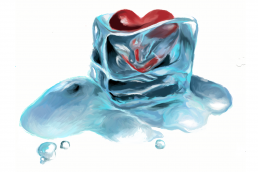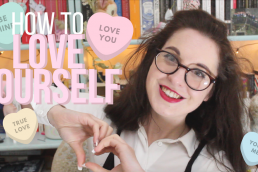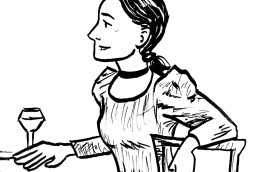by Cinzia DuBois
Transcript:
“I get it: you’re stressed out, big time. Don’t worry; that’s expected: you’re part of Generation Stress and never fear because you’re in the hands of a stress expert, I’ve been through it all. I had my first official, medically recognisable breakdown when I was sixteen and from thereon they became somewhat custom, developing with intensity and severity as time went on. Like many millennials out there, academic stresses and financial difficulties affected my mental health badly, and in my case induced several severe eating disorders, depression, insomnia, and chronic anxiety. Everyone in Generation Stress is unique so I assume it’s safe for me to say you are suffering in your own ways, and the reason you’re here is because you want it to stop. No more stress. Forever. Done.
I suspect you’ve tried it all: you’ve done yoga, completed several colouring in books, and regularly listened to random soothing sound playlists on Youtube. Some of you may have found calming methods which worked, though others may still be looking for “the cure”. Having said this, the chances are that even if you do find techniques like meditation, knitting or drawing helpful at lowering your stress levels, you clicked on this video because you still get stressed.
Everybody gets stressed; we all at some point in our lives try to get more things done than we have the time to do, we all have financial worries, health problems, academic pressures of essay deadlines and exams to revise for, social media stressors, career issues, family issues, social responsibilities, relationship difficulties: usually all going on at the same time! Of course you’re stressed, and what makes stress interesting is that it’s more than an emotion: it’s also a physical response. Stress releases cortisol which raises heart rate, modulates adrenaline levels and clouds thinking; in fact stress is renowned as something that makes you sick.
I’m not sure about you but I’ve been noticing a trend over the past few years on social media which I like to call “The Stress Status”. Now don’t get me wrong, one of the most important things to do when you are stressed is to ask for help, but people seem to have taken this the wrong way nowadays. They don’t ask for help: they just tell people they’re stressed. Actually, they boast about it. People have found pride in gloating about their stress levels; we have to tell everyone about what we are doing, about how much we have going on, how we’re SO busy and we just don’t know what to do about it!
This in turn triggers others who aren’t stressed to be stressed about not being stressed, or not stressed enough. Stressed out people are put up on a pedestal, they’re #goals. Being stressed is the ultimate status symbol of a productive and meaningful existence.
We also like to pride ourselves on pre-suffering: we wake up and first thing we say to ourselves or to those around us is: “I’m going to be tired by the end of today.”
Hold the phone: what kind of weird, twisted society do we live in that people are admired for sharing their daily martyrdom, and those who do not meet such expectations should feel ashamed for not suffering enough?
Spoiler alert: this method isn’t working, and this mindset isn’t healthy!
We can talk about the essential steps to avoid burnout such as maintaining a good nutritious diet, doing physical activities, taking breaks, getting plenty of sleep etc. But none of this is going to work without completing the crucial first step: stop seeing stress as a negative thing.
People have spent lifetimes demonising stress, labelling it as a killer and life destroyer: but actually it’s just a natural part of life that everyone experiences and having this attitude towards stress is, ironically, stressful, because it makes it sound terrifying and ultimately petrifies you when you start to experience it.
It’s not about avoiding stress necessarily, as this can be impossible at times. Instead it’s about changing the way you think about stress. We usually associate the signs of anxiety, such as increased heart rate, sweating and breathing more rapidly, as a sign that we’re not coping well with the pressure. However, if you start seeing these symptoms in a positive light, regarding them as signs that your body is ready and excited for the challenge ahead, you will find the situation more empowering than destructive. Your heart is pounding because it’s energised. You’re breathing more to get more oxygen to your brain.
By changing your mindset about stress — by seeing it as a helpful response, as a sign of your body rising to the challenge — you ultimately change your body’s response to stress. Research undergone by Stanford psychologist Kelly McGonigal revealed that the blood vessels of stressed individuals who viewed stress as a positive experience remained relaxed, and had a healthier cardiovascular profile than stressed individuals who deemed stress dangerous.
Every part of our lives is susceptible to inducing stress, so rather than thinking of ways to avoid stress, it’s more beneficial and healthier to change how you view stress and ultimately change your experience of it. From stress you can create a biology of fearlessness and fortitude.
So for now, if you’re someone who is feeling the burnout of stress take the time to recover properly. Take a break which is entirely disassociated from your workload and includes high density fun — that means doing more than just scrolling through Reddit, Facebook and watching Youtube videos. Take a day or so to yourself to organise your mind and life; write out your goals, values, a reasonable and forgiving schedule, clean your room or flat, and just give yourself time to gather your thoughts and emotions before tackling the stressful things in your life — only this time with a whole new braver and stronger mindset.
Lots of love,
Cinzia x”
Cinzia DuBois
Cinzia is a passionate bibliophage, writer and literary researcher from Scotland whose socially awkward mannerisms can be attributed to bibliophilic nurturing.
She studied her Masters in Literature at the University of Edinburgh, and her BA in Classics and Literature at the University of Birmingham. She produces her own podcasts, videos and writing essays. Oh, and she reads a lot, obviously. But that would be like adding at the end ‘she also spends a lot of her free time breathing.’







